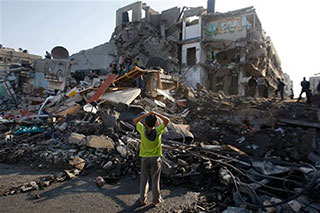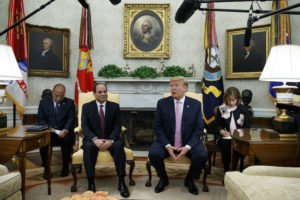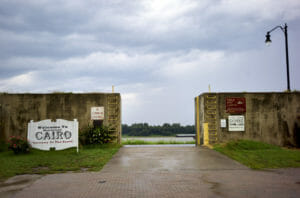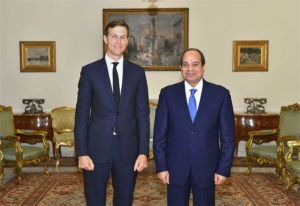Dispatches From Cairo: All Children Go to Heaven
"Is this the work of a God-fearing people?" screamed our neighborhood imam over the loudspeakers during Friday's passionate sermon. The innate hostility in regard to Israel tilts toward hatred.Egyptians are aware of their country's important role in this conflict, and are watching President Mohamed Morsi's position closely.
We asked Lauren Unger-Geoffroy, an international artist who lives in Cairo, to share her perspective of life in Egypt after the revolution. In this entry, she writes about Egypt’s reaction to the bombardment in Gaza.
Monday at 7 a.m., I was awakened by an Egyptian army platoon practicing marching formations in the square under my window. Sleep has been difficult to come by lately anyway with the water main in our neighborhood broken leaving us without water for three days in a row as the infrastructure here continues to deteriorate. I was watching my friend Reem’s 5-year-old daughter Dalia until Monday night when Reem would return from Gaza. Little Dalia was afraid to look out of the window.
It was strange, the marching chant, the “left! right!,” the yelling of the sergeant echoing in the empty square below. These soldiers had never congregated here before, or not at least in this area’s recent memory. Sunday we had been shaken up by the deafening noise of low-flying fighter planes. Perhaps this was to remind us that yes, Egypt’s military is a force to be taken seriously.
This was following the week’s buildup of emotional outrage over Israel’s merciless and relentless strikes in Gaza. The media have not held back the flood of ghastly images of bloody, burnt children’s bodies and emotional narratives in all languages.
“Is this the work of a God-fearing people?” screamed our neighborhood imam over the loudspeakers during Friday’s passionate sermon. “We cannot allow these atrocities!” The innate hostility in regard to Israel tilts toward hatred.
Egyptians are aware of their country’s important role in this conflict, and are watching President Mohamed Morsi’s position closely. They debate unrealistic ideas of military intervention. They find President Obama’s blurry diplomatic tightrope walking confusing. The two leaders face similar public opinion and pragmatic political conflicts.
Saturday, Egyptians woke up to the news that a train had smashed into a full school bus in Assiut, killing 51 children ages 4 to 7. The surrounding area was littered with bloody children’s notebooks, body parts, little shoes. Parents screamed as sobbing people collected remains in garbage bags. There is a large sign outside the mosque on my corner that reads, “ALL CHILDREN GO TO HEAVEN.”
Reem was participating in Egypt’s historic 561-person convoy Sunday, crossing the Rafah border into Gaza from Egypt to give support and assistance to the Palestinians under fire. Many were numbed by the combined visions of death.
“Oh my God,” she texted on her way to Rafah in a minibus full of activists. “So many dead children. It is all becoming confused in our minds. We can’t accept any more, and the Israelis are killing children intentionally.”
Her child was watching cartoons and drawing pictures in my loft, dressed in her pink T-shirt and pants while waiting for her mommy to return. She showed me a picture she had drawn of a little girl with a flower and many hearts. “That is for all the children who had to go to heaven,” she said.
I didn’t know which ones she meant.
Egypt’s transport minister resigned over the train crash. I couldn’t help but reflect on my impressions of Egypt’s ministers, particularly those of electricity and petrol who couldn’t cooperate at a conference on energy last week that I attended. They predicted that blackouts will be even worse for the next two summers, explaining a plan to have people reduce their consumption of electricity, using only one air conditioner, lighting one room at a time. Wealthy people will not do this, I thought. There will be a slashing of fuel subsidies for the poor.
There is a deep sense of helplessness and lack of competence here. It was revealed recently that the reason there are insufficient supplies of fuel to power Egypt’s electricity needs is more because of inefficient technical infrastructure than a true lack of fuel available. It is not understandable to those in the developed West. Nothing is clear here. Everything is fluid, shifting sand underfoot, unstable, changing and corrupting any intentions with dust and the garbage of the more than 80 million.
The people are unhappy, uncomfortable, poor and disappointed in Morsi’s apparent inability to get Egypt on track. “He is too weak,” they say.
Many are hostile toward the Muslim Brotherhood. There seems to be a growing polarization between the Islamists and the secularists, with the pendulum swinging back toward the secular as discontent with the Muslim Brotherhood’s inadequate governing performance builds. Once again, Egypt is in a major position on the global chessboard. Will it know how to use this position to help itself?
Reem and the other activists returned to Cairo on Monday night to find massive demonstrations around Tahrir Square, the now iconic center of Egyptian protest. But there were only several hundred denouncing the Israeli strikes inside Tahrir Square. A much larger crowd of several thousand people was jammed into adjacent Mohamed Mahmoud Street near the Ministry of the Interior to commemorate the martyrs who lost lives and eyes in last year’s bloody massacre. The chants were the same in both places: “The people want the fall of the government” and many expressing anti-Muslim Brotherhood sentiments. There were big signs at the entrance to Tahrir and on Mohamed Mahmoud saying “Muslim Brotherhood Not Allowed Here.”
There were Palestinian flags along Mohamed Mahmoud Street, but the focus was on remembering and re-enacting the 2011 clash. The demonstrators yelled, “the martyrs will not be forgotten,” “the revolution lives!” “where were you, the Brotherhood?” They also threw rocks and tore down the stone wall protecting the ministry, provoking responses of tear gas and gunfire. Tweets of rekindled revolutionary passion peppered social media. A tree caught fire in the protests.
Meanwhile, Morsi has worked to broker a truce that would include breaking the siege and ending all military operations. Some sources claim a truce was already being prepared by the Hamas leaders who were bombed in Gaza. Some say that Israel has created a vacuum that will be filled by a more aggressive, vengeful and focused militia with Arab League support. We shall all soon see.
Amid all this unrest, more ground slid down Egypt’s slippery political slope as church leaders decided definitively to withdraw their members from the Constituent Assembly. The ever-evasive new Egyptian Constitution is still being menaced by a Shariah overload.
The activists returning from Gaza were exhausted and most did not press into the crowd on Mohamed Mahmoud. Reem called from the periphery. “I’m coming sweetie!” she told Dalia, who was so happy she tore herself from the cartoon she was watching and jumped around after the call chatting into her toy iPhone. “My mommy has a real one and she will let me play with it,” she said smugly.
After Reem had retrieved her daughter, I saw that Dalia had left her drawing trampled on the rug. On it she had scribbled blood red crayon all over the little girl.
Your support matters…Independent journalism is under threat and overshadowed by heavily funded mainstream media.
You can help level the playing field. Become a member.
Your tax-deductible contribution keeps us digging beneath the headlines to give you thought-provoking, investigative reporting and analysis that unearths what's really happening- without compromise.
Give today to support our courageous, independent journalists.





You need to be a supporter to comment.
There are currently no responses to this article.
Be the first to respond.